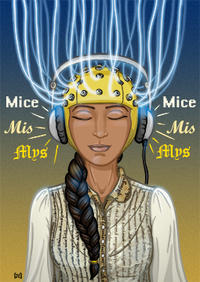Journey of Words

From manuscript to mind:
The vocabulary of any language comes from different sources as words are often borrowed from one language into another, especially in situations of language contact.
English, for example, shares many words with French because a large number of French and Latin (Romance) borrowings entered the English language, particularly after the Norman Conquest in 1066.
Other languages, for example Dutch and German, have also borrowed a considerable number of Romance words. When a word is borrowed, its pronunciation is adapted to fit the sound system of the new language (e.g. ‘beef’ from Old French ‘boef’). Therefore, there are many cases where the same word is borrowed into different languages but is pronounced differently because the languages’ sound systems differ.
In the Journey of Words project, we are investigating the stress patterns of Romance loanwords in Dutch, English, and German.
Some of these words are pronounced in the same way in all three languages (e.g. vendétta) while others show certain differences particularly in vowel quality and stress (e.g. horízon (E), hórizon (D), Horizónt (G)).
The project consists of two distinct research strands:
- A historical theoretical study in order to create a timeline of borrowings as well as a synchronic description of patterns of phonological adaptation into the three host languages.
- A psycholinguistic investigation concerned with the processing of words which differ in their stress patterns across the languages in Dutch and German second-language (L2) learners of English.
For more information visit our project website: https://journeyofwords.ling-phil.ox.ac.uk/
Project Team
The Journey of Words (JoW) project combines psycho- and neurolinguistic investigations with historical linguistic analyses to investigate stress patterns of Romance loanwords in English (E), Dutch (D) and German (G).
All three languages belong to the West Germanic branch of the Germanic family. Many identical Romance loans have become part of the every-day vocabulary in the course of the last few centuries:
Paníek (D), pánic (E), Pánik (G)
Universitéit (D), univérsity (E), Universitä́t (G)
krokodíl (D), crócodile (E), Krokodíl
Although the basic West Germanic phonological and morphological patterns are similar across all three languages, it is surprising that the phonology of these loans can be so different in English, Dutch and German. In particular, the stress may fall on different syllables (marked with an acute accent over the vowel and in bold).
The JoW project addresses the following questions from two points of view:
Historical Linguistics
- Why is the adaptation of the loans different across the three languages?
- What is the precise timeline of borrowing of Romance loans into Dutch, English and German?
Psycholinguistics
- How do these phonological differences affect the comprehension and processing of such loans in L2 speakers of English who have Dutch or German as their native language?
For further reading, here are some of our recent publications and presentations:
Conference Proceedings
Fritz, I., Lahiri, A., & Kotzor, S. (2021). The role of metrical stress differences in learner word recognition. ExLing 2021: pp. 85-88.
Conference Presentations
Fritz I., & Lahiri, A., Kotzor, S. (2021). The Role of Lexical Stress Differences in Learner Word Recognition. 27th AMLaP Conference, Paris, held online, September 2021, short talk. Click here to view our AMLAP 2021 paper.
A recent talk for language teaching professionals:
Kotzor, S., & Fritz, I. (2021) ‘Crocodile or Kroko’dil: effects of stress differences on second-language processing. PronSIG Online Conference, 2 October 2021.
This talk presented the results of psycholinguistic experiments to determine whether differences in stress patterns of words which exist in both first and second languages cause processing difficulties for German and Dutch learners of English. It also
discussed the experimental data to assess the contribution that these results might make to classroom practice and material design.
PronSIG is the Pronunciation Special Interest Group at IATEFL and further details of the 2021 PronSIG Online Conference
may be found here:



